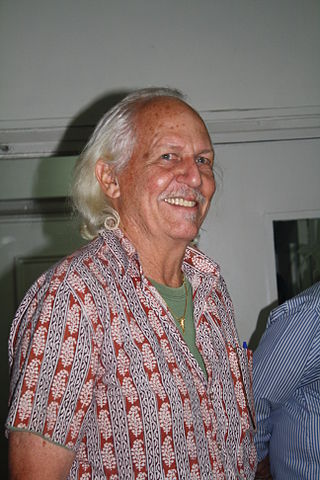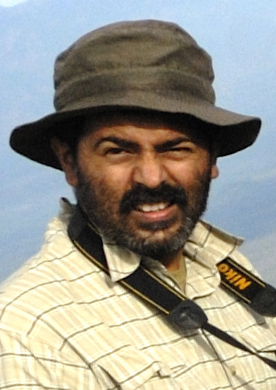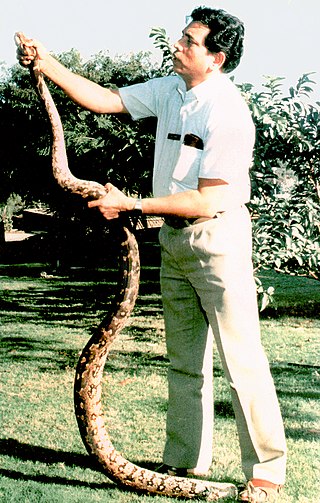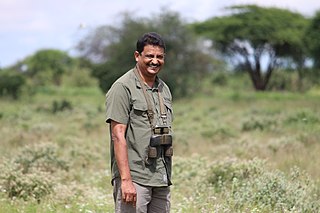
Japalura austeniana, also known commonly as the Abor Hills agama or Annandale's dragon, is a rare species of lizard in the family Agamidae. The species is endemic to Asia.

Lycodon gammiei, commonly known as Gammie's wolf snake or the Sikkim false wolf snake, is a species of nonvenomous snake in the family Colubridae. The species is endemic to India.

Romulus Earl Whitaker is an American-born Indian herpetologist, wildlife conservationist, and founder of the Madras Snake Park, the Andaman and Nicobar Environment Trust (ANET), and the Madras Crocodile Bank Trust. In 2008, Whitaker was selected as an associate laureate in the 2008 Rolex Awards for Enterprise for his efforts to create a network of rainforest research stations throughout India. In 2005, he was a winner of a Whitley Award for outstanding leadership in nature conservation. He used this award to found the Agumbe Rainforest Research Station in Karnataka, for the study of king cobras and their habitat.

The Bugun liocichla is a passerine bird species from the family Leiothrichidae closely related to the Emei Shan liocichla. First spotted in 1995 in Arunachal Pradesh, India, it was described as a new species in 2006. The description was made without the collection of a type specimen as they were too few to risk killing one. It is thought to be an endangered species, with a small population, and a very restricted distribution range within which commercial development threatens the habitat.

Eaglenest or Eagle's Nest Wildlife Sanctuary is a protected area of India in the Himalayan foothills of West Kameng District, Arunachal Pradesh. It conjoins Sessa Orchid Sanctuary to the northeast and Pakhui Tiger Reserve across the Kameng river to the east. Altitude ranges are extreme: from 500 metres (1,640 ft) to 3,250 metres (10,663 ft). It is a part of the Kameng Elephant Reserve.

The Nature Conservation Foundation is a non-governmental wildlife conservation and research organisation based in Mysore, India. They promote the use of science for wildlife conservation in India.

Mysore Doreswamy Madhusudan is an Indian wildlife biologist and ecologist. He is the Co-founder and Director of Nature Conservation Foundation, Mysore and a Visiting Research Fellow at the University of Leeds. He has worked on understanding and mitigating the effects of human-wildlife conflict in the Nilgiri Biosphere Reserve in South India. He has also worked in several other forests in the Himalayas and North-east India. In 2004, he was one among the team of wildlife biologists who described Arunachal macaque, a new species of macaque from Arunachal Pradesh, India.
The Kameng River in the eastern Himalayan mountains, originates in Tawang district from the glacial lake below snow-capped Gori Chen mountain 27°48′36″N92°26′38″E, elevation 6,300 metres (20,669 ft), on the India-Tibet border and flows through Bhalukpong circle of West Kameng District, Arunachal Pradesh and Sonitpur District of Assam, India. It becomes a braided river in its lower reaches and is one of the major tributaries of the Brahmaputra River, joining it at Tezpur, just east of the Kolia Bhomora Setu bridge.

Sessa Orchid Sanctuary is a 100 km2 protected area of India in the Himalayan foothills in Bhalukpong Forest Division of West Kameng District, Arunachal Pradesh. It conjoins Eaglenest Wildlife Sanctuary to the southwest. It is a part of the Kameng Protected Area Complex (KPAC), which is an Elephant Reserve. See map. The department of Environment & Forests has developed trekking routes for visitors to enjoy the natural habitats of orchids. There are deep gorges and valleys, high peaks and rugged terrain that are rewarding for nature lovers and adventure tourists. A nursery includes representative specimens of various orchid species of the sanctuary and a demonstration farm of Cymbidium hybrids for cut-flower production. Most of Sessa has traditionally been claimed by the Bugun tribe as part of their territory.
Pakke Tiger Reserve, is a Project Tiger reserve in the East Kameng district of Arunachal Pradesh in Northeast India. The 862 km2 (333 sq mi) reserve is protected by the Department of Environment and Forest of Arunachal Pradesh. It was known as Pakhui Tiger Reserve, but renamed in April 2001 by the Governor of Arunachal Pradesh. It has won India Biodiversity Award 2016 in the category of 'Conservation of threatened species' for its Hornbill Nest Adoption Programme.

Arvind Gupta is an Indian science educator, toy inventor, author, translator and scientist. He received the civilian award Padma Shree from the Indian government on the eve of Republic Day, 2018.

Sathyabhama Das Biju is an Indian amphibian biologist, wildlife conservationist and heads the Systematics Lab at the University of Delhi, Department of Environmental Studies and is currently in Harvard University as a Radcliffe Fellow at the Radcliffe Institue for Advanced Study. He is dubbed as the "Frogman of India" by media for his passion for frogs and for bringing fresh fascination for Indian amphibians.

Mayureswar Wildlife Sanctuary is located in Tehsil Baramati in Pune district in Maharashtra, India. It is 74 km from Pune and 35 km from Daund.
Nirmal Ulhas Kulkarni is a herpetologist, field ecologist, conservationist, and wildlife photographer. Director (Ecology) of Wildernest Nature Resort, an eco-tel in the Chorla Ghats (Goa), Chairman of the Mhadei Research Centre, Team Lead of Hypnale Research Station and promoter of HERPACTIVE, a study initiative on Herpetofauna. As of December 2012, he lives in Goa.

Sunil Kumar Verma, was an Indian biologist and a principal scientist at the Centre for Cellular and Molecular Biology, Hyderabad, India. Verma was primarily known for his contributions to the development of "universal primer technology", a first generation DNA barcoding method, that can identify any bird, fish, reptile or mammal from a small biological sample, and satisfy legal evidence requirements in a court of law. This technology has revitalised the field of wildlife forensics and is now routinely used across India to provide a species identification service in cases of wildlife crime. This approach of species identification is now known as "DNA barcoding" across the world.

Lalji Singh FNA, FASc was an Indian scientist who worked in the field of DNA fingerprinting technology in India and pioneer of Assisted reproductive technology, where he was popularly known as the "Father of Indian DNA fingerprinting". Singh also worked in the areas of molecular basis of sex determination, wildlife conservation forensics and evolution and migration of humans. In 2004, he received the Padma Shri in recognition of his contribution to Indian science and technology.
Indian Birds is a bi-monthly ornithology journal/newsletter that was established in 2004. It was formerly published under the heading Newsletter for Ornithologists for one year. It publishes articles on identification, distribution, migration, conservation and taxonomy, apart from reports of significant ornithological sightings and events. Published from Hyderabad, the publication is owned by New Ornis Foundation.

Aparajita Datta is an Indian wildlife ecologist who works for the Nature Conservation Foundation. Her research in the dense tropical forests of Arunachal Pradesh has successfully focused on hornbills, saving them from poachers. In 2013, she was one of eight conservationists to receive the Whitley Award. She is also a Co-Chair of the IUCN Hornbill Specialist Group.

Sanjay Gubbi is a conservation biologist based in Karnataka, India. His work focuses on the conservation of large carnivores like tigers and leopards, working on applied aspects and understanding their population biology, proposing conservation policies for their protection, and working to minimize human-wildlife conflict. He currently works as a scientist with Nature Conservation Foundation, a Mysore based NGO.

Yadvendradev Vikramsinh Jhala is an Indian scientist and conservationist who recently ended his tenure as the Dean at the Wildlife Institute of India in Dehradun.
















